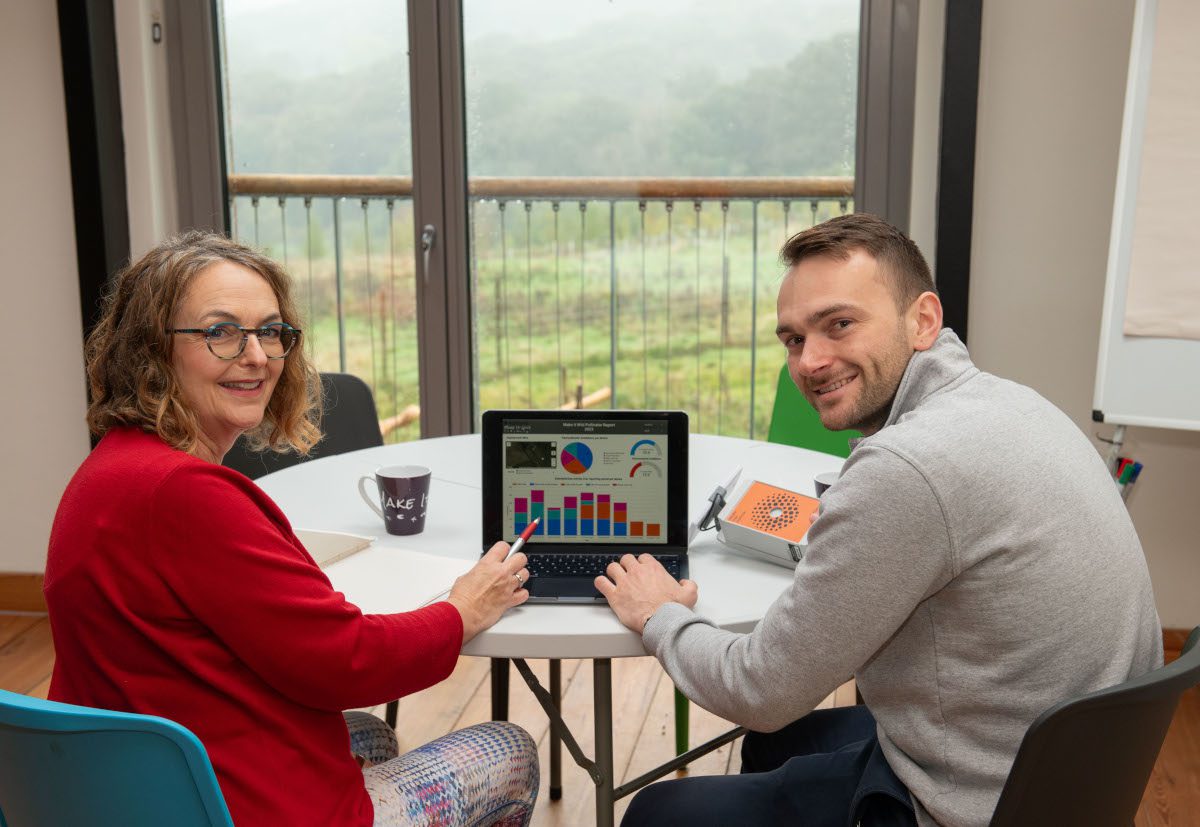
Launching at a time when prominent Royals have just been widely reported expressing opinions on what they see as negative impacts of rewilding, a supposedly groundbreaking environmental partnership using trailblazing AI algorithms to demonstrate the positive impacts of rewilding farmland is newly underway in North Yorkshire. Intended to support programmes for nurturing and boosting pollinator activity in the area, national rewilding project ‘Make it Wild’ has teamed up with Ag-tech start-up AgriSound in an initiative they say is already providing demonstrable evidence of the significant benefits to pollinators and local biodiversity.
Ag-tech innovator AgriSound has provided four bespoke ‘Polly’ bioacoustic listening devices to monitor and produce robust data on the biodiversity and wildlife in areas that Make it Wild manages. These are allowing Make it Wild to gather irrefutable, data-driven evidence to show its rewilding in Harrogate’s Bank Woods is leading to more pollinators and a significantly greater biodiversity than conventionally farmed land.
AgriSound’s Polly monitoring devices use cutting-edge AI tracking algorithms to recognise the sounds of pollinators and provide actionable data to improve land management strategies. Over just the past four months, the data collected has shown marked differences between pollinators levels across the site, and how the habitat influences the movement of pollinators. This data, gathered in real time, is providing Make it Wild with the capability to track which areas have the highest number of pollinators, and demonstrate where there is a noticeable increase throughout Bank Woods, adjusted for seasonal variations. Pollinator activity has increased by 38% since rewilding started at the site.
Increasingly widely employed in commercial, regenerative agriculture, by food producers, helping revolutionise commercial pollination and increasing crop yield, this is the first time AgriSound’s Polly bioacoustic listening devices have been used in rewilding. They are also now being used to produce crucial ESG data to businesses looking to minimise their impact on the environment, and recently worked to provide essential data to support biodiversity conservation.
Make it Wild works with household names such as Footasylum and De Vere, through tree planting, or the sponsorship of other habitat creation projects to help reduce their carbon footprint and showcase their dedication to sustainability. Businesses such as Tesco and Marks & Spencer’s seemingly work with AgriSound for similar reasons, with the Polly insect listening device feeding data into their sustainability efforts, strengthening their ESG reporting.
Groups such as the Yorkshire Rewilding Network and Rewilding Britain are pillars of the movement, with the Rewilding Innovation Fund providing financing opportunities enabling large-scale restoration of ecosystems.
The Government has put down plans for large-scale nature recovery projects that will make funding available to farmers looking to provided habitats for wildlife by rewilding. The total amount available for such schemes is reportedly anticipated to reach between £700m and £800m a year by 2028. If these plans are successful, it’s thought that rewilded farms could support more local employment and support the local economy more than conventional farms.1
Make it Wild’s ambitious Harrogate project has involved removing the sheep, planting numerous trees, and restoring diverse habitats, including semi-improved pasture, gorse, upland scrub, small streams, and ancient woodlands.
Founders, Christopher and Helen Neave bought their first piece of land to rewild as a family project in 2010 in response to the UK’s ever-deepening ecological crisis, that has seen wildlife numbers plummet 70% since 1970. The impact on biodiversity of their rewilding and woodland creation was so great, that they decided to set up Make it Wild so they could have even more impact.
Helen Neave said about the collaboration: “We know that pollinators are in deep trouble, and they are a crucial part of our ecosystem. In order to support our rewilding efforts and increase pollinator populations, we’re very much anticipating the use of data from these Polly devices.
“We are the only rewilding project to be using AgriSound’s monitoring devices, which can provide a crucial source of data on biodiversity. Rewilding is often mis-understood, and seen to threaten conventional farming, but we believe that the two philosophies of land management can work together.
“We are in the midst of the sixth mass extinction, and eager to demonstrate how we can make a difference in our impact on nature to reduce destruction and loss of habitat. The number one focus of our rewilding project is to increase biodiversity, and gathering data to show the positive results will be fundamental to our future success. We hope our partnership with AgriSound will underscore the importance of gathering demonstrable data for such initiatives and lay the ground for others to follow suit.”
Casey Woodward, CEO of AgriSound, stated about the project: “We’re constantly developing our AI bioacoustic monitoring technology to support an increasing variety of bespoke executions and we are excited to see how our data-driven approach to pollinator monitoring can be used in rewilding projects to protect and boost biodiversity.
“We’re being asked to develop algorithms for increasingly inventive uses of the Polly in order to protect pollinators alongside our regenerative farming projects, and this rewilding project sets an exciting precedent for how our bioacoustic monitoring AI technology can be used for conservation.”
Notes
[1] https://www.rewildingbritain.org.uk/press-hub/nbe-new-report







